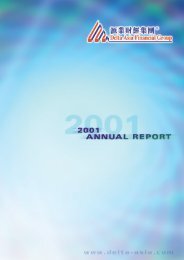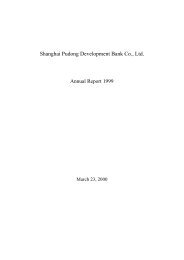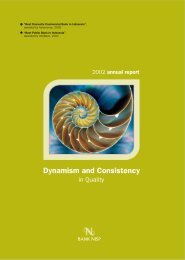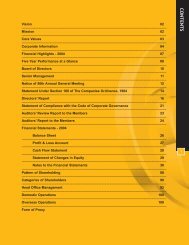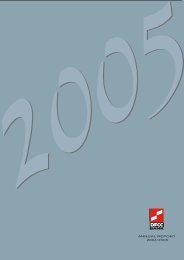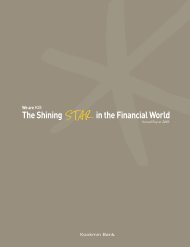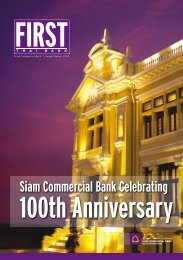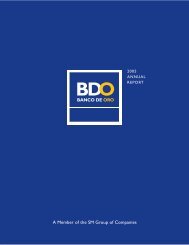2004 - Asianbanks.net
2004 - Asianbanks.net
2004 - Asianbanks.net
- No tags were found...
You also want an ePaper? Increase the reach of your titles
YUMPU automatically turns print PDFs into web optimized ePapers that Google loves.
Changes in Accounting PoliciesOn January 1, <strong>2004</strong>, the following new accounting standards became effective and were adopted by the Group:Statement of Financial Accounting Standards (SFAS) 12/International Accounting Standard (IAS) 12, Income Taxes,requires deferred income taxes to be determined using the balance sheet liability method. The adoption of thisstandard resulted in a retroactive downward adjustment to surplus as of December 31, 2003, 2002 and 2001amounting to P=1.9 billion, P=2.1 billion and P=2.2 billion, respectively. Net income increased by P=165.8 million in 2003and P=166.7 million in 2002.In accordance with this new standard, deferred income tax liability is provided on revaluation increment of property,plant and equipment on a retroactive basis, which decreased capital funds by P=628.0 million, P=627.7 million and P=616.2 million as of December 31, 2003, 2002 and 2001, respectively.• SFAS 17/IAS 17, Leases, prescribes the accounting policies and disclosures applicable to finance andoperating leases. The adoption of the standard resulted in the recognition of lease income and expense underoperating leases on a straight-line basis. Previously, all leases were recognized in the statements of income onthe basis of the terms of the lease agreements. The adoption of this accounting standard resulted in aretroactive downward adjustment to surplus as of December 31, 2003, 2002 and 2001 amounting to P=206.6million, P=177.4 million and P=158.9 million, respectively. Net income decreased by P=29.1 million in 2003 andP=18.5 million in 2002.Additional disclosures required by the new standards have been included in the financial statements, whereapplicable.New accounting standards based on IAS and International Financial Reporting Standards, referred to as PhilippineAccounting Standards (PAS) and Philippine Financial Reporting Standards (PFRS), respectively, will becomeeffective in 2005. The Group will adopt the following new accounting standards approved by the AccountingStandards Council, to the extent that they are applicable, effective January 1, 2005:• PAS 19, Employee Benefits, provides for the accounting for long-term and other employee benefits. Thestandard requires the projected unit credit method in determining the retirement benefits of the employees anda change in the manner of computing benefit expense relating to past service cost and actuarial gains andlosses. It requires the Group to determine the present value of defined benefit obligations and the fair value ofany plan assets with sufficient regularity that the amounts recognized in the financial statements do not differmaterially from the amounts that would be determined at the statement of condition date.The effect of adopting this standard will result in either a transition liability or an asset with a correspondingadjustment to surplus as of January 1, 2005. The Group will engage the services of professionally qualified actuaryto determine the quantitative impact of adopting this standard in 2005.• PAS 21, The Effects of Changes in Foreign Exchange Rates, prohibits the capitalization of foreign exchangelosses. The standard also addresses the accounting for transactions in foreign currency and translating thefinancial statements of foreign operations that are included in those of the reporting enterprise by consolidation,proportionate consolidation and equity method. The adoption of this standard will have no material impact onthe financial statements.• PAS 30, Disclosures in the Financial Statements of Banks and Similar Financial Institutions, provides for therequired disclosure and presentation in respect of the accounts of banks and similar financial institutions. It alsoprovides that provision for general banking risk is treated as appropriation of surplus and should not be includedin the determination of <strong>net</strong> income for the period. The Group has yet to determine the effect of this standard inthe context of the need to reallocate the general reserve to cover any increase in specific loan loss reservesrequired under PAS 39 (see discussion on PAS 39 below). The required new disclosures will be included in thefinancial statements upon adoption of this new standard in 2005.- 41-



